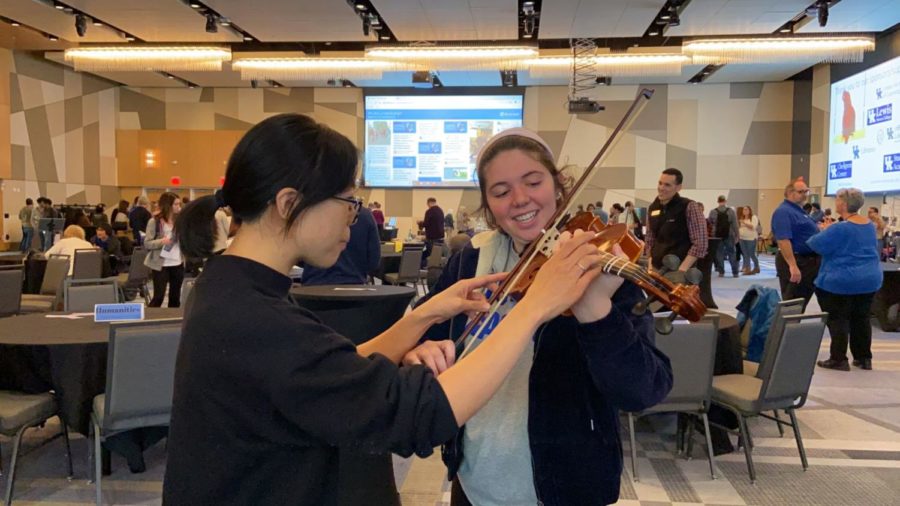UK’s Curiosity Fair shows the lighter side of learning
October 29, 2019
The usual reaction to a brain in a vat is to run away screaming.
But at the UK Curiosity Fair, people gathered around the philosophy department’s preserved brain on purpose, as part of celebration of the importance of curiosity in education.
“We’re noticing that sometimes students and faculty feel like education is a little bit of a drudge,” said Beth Kraemer. “We’ve got such an emphasis on testing and just all these structures that can sort of take the fun out of learning and we wanted to have an event that we put the fun back into learning.”
Kraemer was a co-chair of the planning committee that put together the Curiosity Fair, which was sponsored by five organizations on campus, including UK Libraries and the Center for the Enhancement of Learning and Teaching.
Brains in vats weren’t the only unusual sight at the second annual event – a mindfulness labyrinth, neuroscience mind control and virtual reality games were just some of the 40 “curiosity stations” available for both UK students and the public to enjoy.
Josh Dutta and Panhavuth Phe said they were most surprised by the HoneyBee Observation Hive offered by the agriculture department.
“I knew bees communicated through pheromones, but I didn’t know that bees’ pheromones are like really common scents that exist elsewhere,” said Phe, a freshman neuroscience major.
Dutta said he also enjoyed the machine learning station because it ties into his interests as an electrical engineering student.
Most of the stations were offered by UK-affiliated people, said Kraemer, including faculty, staff and students. She said they did have one “hired gun,” a magician who was also popular at last year’s inaugural Curiosity fair.
Booths ranged from science and technology to music and arts, and often mixed those disciplines, said Kraemer.
“There’s a nice diversity of different topics present here and I kind of enjoyed that. It’s not just science, there’s other stuff as well,” said Phe.
For some students, the event was an extension of what they’re learning in class. Ashley Stump, a first-year international studies student, said she attended the fair because she’s in a curiosity-based class.
“I think it’s a good idea to get to learn more things about curiosity because we’re taking that class and also it’s really interesting to see all the different things that are at this fair right now,” said Stump. She said she enjoyed the mindfulness labyrinth as it really did make her become more aware.
Shan Jennings attended the event for class, but said she would have come anyway because it was a fun way to try new things.
Jennings spent time at a station offered by the UK String Project, where Dr. Tze-Ying Wu showed her how to hold a viola and play some simple notes.
Wu is a UK professor of string education and the director of the String Project, which aims to provide instrument education for children. Wu wanted to have a booth at the Curiosity Fair to gain visibility for her programs.
“I want to let them know what the music school is trying to do in terms of community engagement. We want to reach out to as many students as possible,” said Wu.
Kraemer said this year’s Curiosity Fair had twice as many booths and that they were hoping to double the number of attendees from last year. Overall, the goal of the event was to showcase the unique kinds of scholarship happening at UK.
“No grades, no tests, just come and have a good time and learn something new,” said Kraemer.
































































































































































